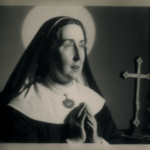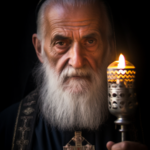St. Thomas Aquinas
St. Thomas Aquinas
When he lived:
St. Thomas Aquinas, often referred to as Thomas of Aquino, lived during the 13th century. He was born in 1225 and died in 1274.
Where he lived:
Thomas Aquinas was born in Roccasecca, a small town in Italy. He spent most of his life in various European cities, including Naples, Paris, and Cologne, where he pursued his education and scholarly work.
Notable world events during the time of his life:
- Mongol Conquests (13th Century): During Thomas Aquinas’ lifetime, the Mongol Empire, under leaders like Genghis Khan and later Kublai Khan, continued its expansion. The Mongol Conquests had a profound impact on Eurasian history, facilitating the exchange of goods, ideas, and cultures along the Silk Road.
- Fourth Lateran Council (1215): A significant event in the Catholic Church, this council occurred just a decade before Thomas’s birth. It defined several key aspects of Catholic doctrine, including transubstantiation (the transformation of bread and wine into the body and blood of Christ during the Eucharist), emphasizing the importance of sacraments in the faith.
- Albigensian Crusade (1209-1229): This series of campaigns against the Cathars, a heretical Christian sect in Southern France, took place during Thomas’s early years. It had a significant impact on the religious landscape of Europe.
- Renaissance of the 12th Century: This intellectual revival, which spanned several centuries, saw the rediscovery of classical Greek and Roman texts and the birth of universities. Thomas Aquinas played a crucial role in this revival, particularly through his integration of Aristotle’s philosophy into Christian theology.
- Inventions of Eyeglasses and the Astrolabe: While not directly related to Aquinas himself, these inventions during his lifetime had a profound impact on science and exploration. Eyeglasses improved the quality of life for many, while the astrolabe aided navigation and contributed to the Age of Discovery in the following centuries.
- Gothic Architecture and Notre-Dame Cathedral: The construction of magnificent Gothic cathedrals like Notre-Dame in Paris occurred during Aquinas’s lifetime. These architectural marvels remain icons of medieval Europe.
His patronage:
St. Thomas Aquinas is widely recognized as the patron saint of students, scholars, and universities. His profound intellectual contributions, particularly in the synthesis of Christian theology and Aristotelian philosophy, have left an indelible mark on the world of education. He is celebrated on his feast day, January 28th, and continues to inspire individuals in their pursuit of knowledge and understanding, transcending religious boundaries with his commitment to reason and faith. Aquinas is also the patron saint of Catholic schools, apologists, and theologians, making his influence felt far beyond his own time and place.
Captive Yet Free
In the year 1225, Thomas is believed to have been born in the castle of Roccasecca, now known as the Lazio region of Italy. His parents, Landolph the Count of Aquino and Theodora the Countess of Teano, were rich. As the youngest son, Thomas was expected to enter the monastery. At the age of five, he was sent to the Benedictine monastery at Monte Cassino. It was his parents’ hope that the young Thomas would later on choose the monastic life and eventually become an abbot.
In 1239, Thomas was sent to Naples and enrolled at the studium generale to complete his studies. It was there that he was first attracted to the philosophy of Aristotle. During his stay at the university, he met John of St. Julian, a Dominican preacher, who greatly influenced him to join the recently founded Ordo Praedicatorum (Order of Preachers), more commonly known as the Dominicans.
When his family knew about Thomas’ decision to join the Order, his mother planned for him to be transferred to Paris. While he was traveling to Rome, Thomas was captured by his brothers, who returned him to their parents at Monte San Giovanni Campano. He was held under strict surveillance for a year. It was there that his family tried to prevent him from joining the Order. Unhindered by his captivity, Thomas taught his sisters and continued to communicate with members of the Dominican Order. When his mother realized that she could not sway Thomas, she tried to save the family name by arranging Thomas’ escape through a window. She held that an escape done in secret was better than appearing to accept her son’s decision.
The Silent Giant
After his escape in 1244, Thomas returned to Naples, then to Rome, where he met Johannes von Wildeshausen, Master General of the Dominican Order. In the following year, he went to study at the University of Paris. It is believed that it was there that he met the venerable St. Albert the Great, who was the Chair of Theology at the College of St. James at the time.
Thomas was described as a quiet student who seldom spoke at the university. This behavior led other students to believe that he was mentally delayed. After he completed his studies, Thomas became an apprentice professor in Cologne. He instructed his students in the books of the Old Testament. It was during this time that he wrote numerous works on philosophy and theology. In 1252, he returned to Paris and pursued his master’s in theology while at the same time serving as a professor of biblical studies. He spent most of his life teaching his students, writing books in theology and philosophy, and holding positions in the Order.
Nothing but You, Lord
In 1273, Thomas was seen by the sacristan Domenic of Caserta in intense prayer, crying and levitating, before an icon of the crucified Christ in the Chapel of Saint Nicholas at the Dominican convent of Naples. During this dramatic moment, Christ is said to have told Thomas, “You have written well of me, Thomas. What reward would you have for your labor?” In turn, Thomas responded, “Nothing but You, Lord.”
After this event, Thomas left his routine of writing his works. When asked why he stopped writing, Thomas replied, “I cannot go on. All that I have written seems to me like so much straw compared to what I have seen and what has been revealed to me.” His celebrated opus Summa Theologiae, his last and, unfortunately, uncompleted work, deals with the whole of Catholic theology. After a lingering illness, Thomas died on March 7, 1274. His remains were placed in the Church of the Jacobins in Toulouse on January 28, 1369. It is unknown who beatified Thomas. However, on July 18, 1323, Pope John XXII canonized him. His feast day is January 28.
Five Interesting Facts About St. Thomas Aquinas
- St. Thomas Aquinas was given the nickname “dumb ox” by his fellow students. This was because of his stout body and his shy and quiet demeanor.
- St. Thomas Aquinas was the mind behind the classic compositions Tantum Ergo and Panis Angelicus.
- In an attempt to seduce St. Thomas Aquinas, his brothers brought a prostitute into his cell. Instead of succumbing to her charms, Thomas wielded a burning stick and chased her away from the castle!
- It has been said that St. Thomas Aquinas had terrible handwriting, yet he managed to write a lot of books!
- St. Thomas Aquinas is the patron saint of students and all universities.
Prayer to St. Thomas Aquinas
O God, who made Saint Thomas Aquinas outstanding in his zeal for holiness and his study of sacred doctrine, grant us, we pray, that we may understand what he taught and imitate what he accomplished. Grant this through Christ, our Lord. Amen.



